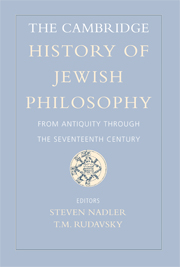Introduction
Published online by Cambridge University Press: 28 May 2009
Summary
This volume of The Cambridge History of Jewish Philosophy covers the period from Jewish philosophy’s beginnings in the Hellenistic era with the Greek writings of Philo of Alexandria to its culmination in the seventeenth century with the radical thought of Baruch Spinoza. Because of the noticeable gap in the philosophical literature between Philo in the first century c.e. and Saadia ben Joseph in the tenth century, most of the studies in this volume are devoted to Jewish philosophy in the medieval period; Philo and Spinoza serve as extraordinary (and very different) bookends to the unprecedented and unsurpassed flourishing of Jewish philosophy in this period.
Any history of Jewish philosophy must deal with two essential questions, often posed as challenges to the whole enterprise of identifying certain writings as instances of something called Jewish philosophy. The first question is: What is Jewish philosophy? That is, what distinguishes Jewish philosophy from the variety of other kinds of Jewish literature – Torah and Bible commentaries, halakhic (legal) and aggadic (homiletic) midrashim or exegeses, rabbinic responsa, and so on. Sometimes, the line between philosophy and some other genre is not particularly clear, and probably not worth insisting upon. The poetry of Judah Halevi, for example, is undeniably philosophical in content; and it would be a great mistake to disregard Maimonides’ halakhic works when studying his philosophy. Moreover, the rabbis of the Talmud and the midrashim were, in many respects, profoundly good philosophers.
- Type
- Chapter
- Information
- The Cambridge History of Jewish PhilosophyFrom Antiquity through the Seventeenth Century, pp. 1 - 16Publisher: Cambridge University PressPrint publication year: 2008
References
- 1
- Cited by



